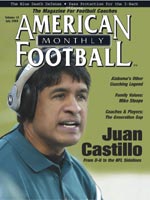AMERICAN FOOTBALL MONTHLY THE #1 RESOURCE FOR FOOTBALL COACHES
Article CategoriesAFM Magazine
|
An Alabama LegendInstant Success: Hoover High School\'s Rush Propst© More from this issue If you seek success akin to that of Hoover (Ala.) High School’s Rush Propst, there’s a simple formula you can follow: • Start from the bottom and work your way up – paying attention to detail not salary. • Make plenty of friends in the business, and stay in touch – frequently. • Understand your limitations. • Always make time for your family and your players. • Keep working hard, or as Propst would say, “Always have a sense of urgency.” • Always seek to learn and innovate. • Make the game fun so your kids will want to practice ....The full article can only be seen by subscribers. Subscribe today!
|
|
|||||||
| HOME |
MAGAZINE |
SUBSCRIBE | ONLINE COLUMNISTS | COACHING VIDEOS |
Copyright 2026, AmericanFootballMonthly.com
All Rights Reserved





